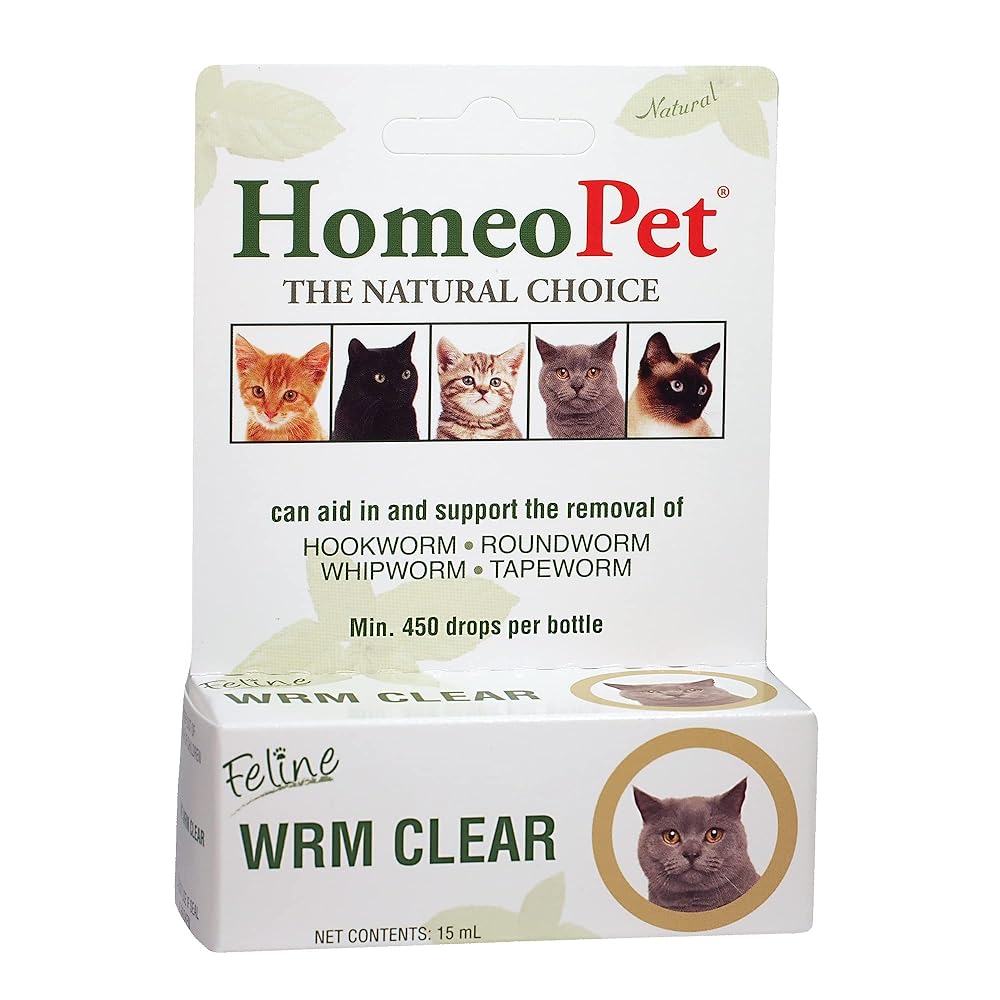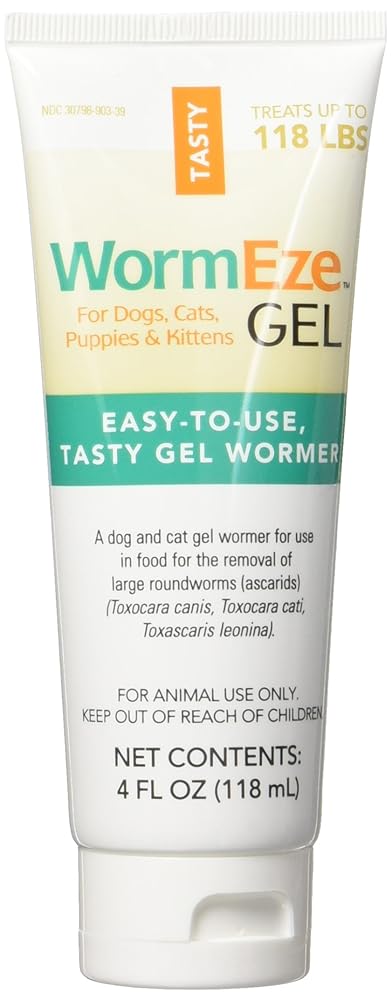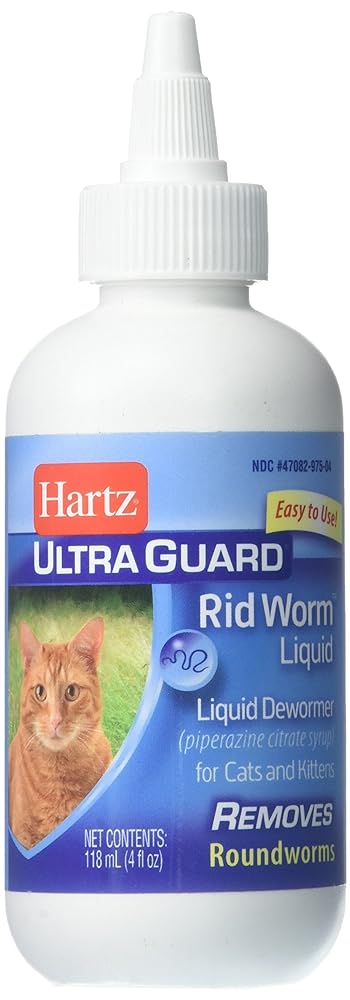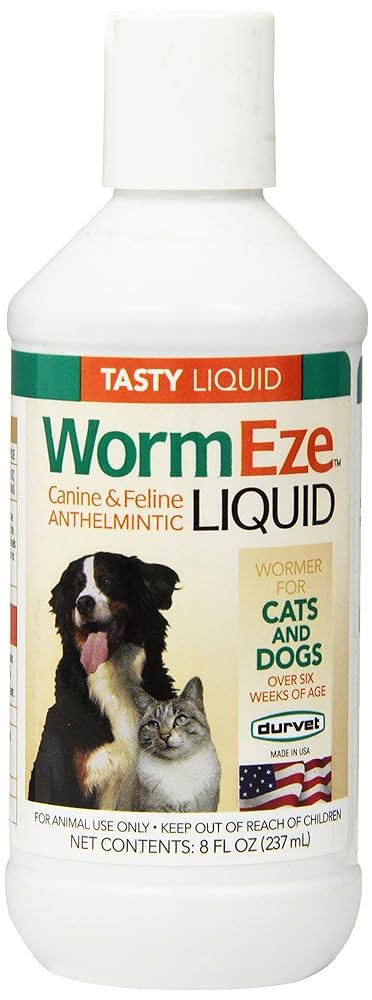Looking for the Best Cat Deworming Treatments? Keeping our feline friends parasite-free is crucial for their overall health and comfort. Worms can cause a host of problems, from digestive issues to more severe complications. This article offers a comprehensive guide to the top deworming solutions for cats, ensuring that you’re equipped with the knowledge to choose the right treatment. Dive in to explore the most effective options for your furry companion.
1. Hartz UltraGuard Rid Worm Liquid
The Hartz UltraGuard Rid Worm Liquid for Cats is a 4 oz dewormer syrup designed to effectively remove roundworms from cats and kittens. This product can be administered directly into the cat’s mouth or mixed into their food for convenience. It is recommended to repeat the treatment 14 days after the first use, and the product should be stored in a cool and dry place to maintain its effectiveness.
2. Durvet WormEze Liquid Canine & Feline Antihelmintic
The Durvet WormEze Liquid Canine & Feline Antihelmintic is an affordable solution for controlling and removing large roundworms, which are commonly found in dogs and cats of all ages. It can be easily administered by adding it directly to the pet’s water or food, making it convenient to use. The product is safe for puppies and kittens over 6 weeks old and is highly palatable for easy consumption.
3. HomeoPet Feline WRM Clear, Natural Tapeworm, Whipworm, Roundworm
HomeoPet Feline WRM Clear is a natural worm medicine for cats that can help remove roundworm, tapeworm, whipworm, and hookworm. It is made from safe and gentle natural ingredients that work with your cat’s immune system to eliminate intestinal worms. The liquid treatment is easy to administer and can be given directly into the cat’s mouth, in water, or during meal times. It is safe for use with cats of all ages and has no known side effects. HomeoPet is a brand founded by Daniel H. Farrington and his veterinarian brother, Thomas Farrington, with the aim of providing high-quality, safe, and affordable treatments and supplements for pets.

4. Peak Marketing Pet Wormer Gel, 4 oz
The Peak Marketing Pet Wormer Gel is a cost-effective solution for controlling and eliminating large roundworms, which are commonly found in dogs and cats of all ages. This product is easy to administer, as it can be applied directly into the pet’s mouth or mixed with their food. It is safe for use in puppies and kittens over 6 weeks old and is highly palatable, ensuring that pets will readily consume it.

What Should I Consider When Choosing a Deworming Product for My Cat?
- Type of Worms: Different dewormers target different types of parasites. Common intestinal worms in cats include roundworms, tapeworms, hookworms, and whipworms. Ensure the product you choose is effective against the specific type of worm your cat has.
- Age and Weight: Some dewormers might not be suitable for kittens or might require dosing based on weight. Always check the product’s label or consult your veterinarian for guidance.
- Effectiveness: Look for reputable brands and products with proven efficacy. Researching reviews or seeking recommendations can help.
- Safety: Check for potential side effects or ingredients that may be harmful. Some cats may have sensitivities or allergies to specific components.
- Mode of Administration: Dewormers come in various forms, such as tablets, liquids, granules, or topical treatments. Choose one that is easy for you to administer and for your cat to accept.
- Frequency of Treatment: Some products might need to be given more frequently than others. Choose one that aligns with your cat’s needs and your ability to administer it consistently.
- Price and Availability: While cost shouldn’t be the only determining factor, it’s essential to choose a product that fits within your budget and is readily available for purchase.
- Veterinary Recommendations: Your veterinarian can provide specific recommendations based on your cat’s health status, age, and lifestyle. They might also be aware of the latest effective treatments.
- Resistance: Over time, parasites can develop resistance to certain treatments. Regularly rotating the type of dewormer (based on veterinary advice) can help mitigate this issue.
- Lifestyle Factors: Indoor-only cats might have different risks compared to cats that venture outdoors or hunt. Choose a product tailored to your cat’s risk level.
What Are Signs My Cat Might Have Worms?
- Visible Worms in Stool or Around Anus: One of the most definitive signs is spotting worms in your cat’s feces or around their rear end. Roundworms can look like spaghetti, while tapeworm segments resemble grains of rice.
- Vomiting: Some cats with a heavy worm infestation, especially roundworms, may vomit up the worms.
- Bloated or Distended Abdomen: Kittens with worms often develop a potbellied appearance due to a significant worm burden.
- Weight Loss: Even if your cat is eating normally, worms can rob them of vital nutrients, leading to weight loss.
- Increased or Decreased Appetite: Some cats with worms may show an increased appetite, while others might be less interested in food.
- Dull Coat: A cat’s coat can lose its luster and appear dull or oily when they’re not getting the necessary nutrients, often due to worms.
- Scooting or Licking the Rear End: If your cat frequently drags its rear end on the ground or licks the area, it might be due to the irritation caused by worms.
- Diarrhea or Bloody Stool: Worms can irritate the intestinal lining, leading to diarrhea. In some cases, there might be blood in the stool.
- Coughing: Lungworms or a migration of roundworms to the lungs can cause coughing.
- Lethargy: A worm-infested cat might appear more tired or less playful due to the decreased nutrients and the body’s effort to fight off the parasites.
- Anemia: In severe cases, especially with hookworm infestations, cats can develop anemia due to blood loss.
Frequently Asked Questions About Cat Deworming Products
- What types of worms can deworming products treat in cats? Deworming products can treat various types of worms, including roundworms, tapeworms, hookworms, and whipworms. It’s crucial to choose a product that targets the specific type of worm your cat has.
- How often should I deworm my cat? The frequency depends on your cat’s age, lifestyle, and the specific deworming product. Kittens often require more frequent deworming, while adult cats might be treated every 1-3 months or even less frequently, depending on their risk factors.
- Are there any side effects associated with cat deworming products? Most cats tolerate deworming products well, but side effects can occur, such as vomiting, diarrhea, loss of appetite, or lethargy. If you notice any unusual reactions, contact your veterinarian.
- Can I give my kitten the same dewormer as my adult cat? Not always. Some dewormers might not be suitable for kittens due to their age or weight. Always check the product label and consult with your veterinarian.
- How do I administer a deworming product to my cat? Dewormers come in various forms, including tablets, liquids, granules, or topical treatments. Follow the instructions on the label or as advised by your veterinarian.
- Can indoor cats get worms? Yes, while outdoor cats are at higher risk, indoor cats can also get worms through various means, such as contaminated soil, fleas, or rodents. Regular deworming is recommended even for indoor cats.
- Do I need a prescription for cat deworming products? Some deworming products are available over the counter, while others require a prescription from a veterinarian. It’s always best to consult your vet before starting any treatment.
- How quickly do deworming products work? Most deworming products begin working within hours of administration, but the time it takes to fully rid the cat of worms can vary. Some products might require multiple doses.
- Can I prevent my cat from getting worms? While you can’t entirely prevent worms, regular deworming, flea control, and avoiding raw meat can significantly reduce the risk of worm infestations.
- What should I do if the worms come back after treatment? Worm reinfestations can happen, especially in cats with high exposure to contaminated environments. If worms return, consult your veterinarian to ensure the correct diagnosis and discuss a more regular deworming schedule or other preventative measures.
Final Summary: The Best Cat Deworming Treatments
In this article, we reviewed the Best Cat Deworming Treatments. Ensuring your feline’s health by preventing and treating worms is of paramount importance. With the options we’ve explored, you are well-prepared to make an informed decision tailored to your cat’s specific needs. Always consult with a veterinarian before starting any treatment. By staying proactive, you’ll ensure your cat remains happy, healthy, and worm-free.






